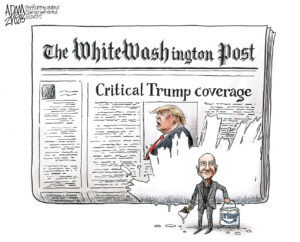The Free Market That Isn’t
“Since 1980, the US government has reduced its intervention in the U economy, which has become much more of a free market" True or false?.
“Since 1980, the U.S. government has reduced its intervention in the U.S. economy, which has become much more of a free market. Conservatives applaud this development because they think that free-market outcomes reward talent and hard work; progressives object to the income inequality of free-market outcomes and want to use government tax and transfer policy to reduce inequality.” True or false?
This is a conservative framing of the story of what has happened to the U.S. economy since the early 1980s, writes University of Notre Dame economics professor Marty Wolfson in Dollars & Sense. It plays into the notion that conservatives are defenders of an economic system that awards success based on merit. It holds that the poor and middle classes should work to emulate — not vilify — the rich, and that those who refuse to play along and instead demand a reduction in inequality via a redistribution of wealth are parasites on a fair system.
The argument, Wolfson writes, “assumes that the outcomes we observe are the result of a free-market economy. However, the right-wing objective has not been to create a free market; it has been to rig government policy and the market so as to redistribute income towards large corporations and the wealthy.”
Humane values demand that the sum of this con game, described below, be made clear to the public that has been duped by it, and that those who can work to restore genuine fairness by changing the rules of how the economy functions do so immediately.
— Posted by Alexander Reed Kelly.
Dig, Root, GrowMarty Wolfson in Dollars & Sense:
For example, conservatives themselves want to use government policy to effect a different distribution of income from what we have now—a distribution that is more favorable to corporations and the very rich. A central policy objective for conservatives, ever since the Reagan Administration, has been to cut taxes on the wealthy. And by cutting government revenue, they have been able to make the argument that government programs for the poor and the middle class need to be cut in order to balance the budget.
Also, conservatives have eliminated restrictions on corporations and protections for workers, consumers, and the environment. They have attacked barriers to international capital mobility, deregulated industries, and reduced government regulations to ensure a safe workplace and a healthy environment.
Because conservative policies have often taken the form of reducing government programs and regulations, the ideology of a free market has been useful in rationalizing them. Other conservative interventions, however, have been less able to fit into the free-market mold, and therefore are especially revealing of conservatives’ genuine aims. When the financial crisis of 2008 threatened the survival of the large banks, they were quick to ask for the government to intervene with a large bailout. The “right-to-work” law recently passed in Indiana, designed to deprive unions of financial resources, is an explicit rejection of a market outcome—the private agreement between management and union to require all workers to pay their “fair share” of the costs of union representation. “Free-trade” agreements, ostensibly designed to eliminate restrictions on the movement of goods and capital, have nonetheless continued to restrict the free movement of people. Even the repeal of financial regulations in the 1980s and 1990s, ostensibly a free-market endeavor, created the anti-competitive giant financial firms that demanded to be bailed out in 2008.
This year, we’re all on shaky ground, and the need for independent journalism has never been greater. A new administration is openly attacking free press — and the stakes couldn’t be higher.
Your support is more than a donation. It helps us dig deeper into hidden truths, root out corruption and misinformation, and grow an informed, resilient community.
Independent journalism like Truthdig doesn't just report the news — it helps cultivate a better future.
Your tax-deductible gift powers fearless reporting and uncompromising analysis. Together, we can protect democracy and expose the stories that must be told.
This spring, stand with our journalists.
Dig. Root. Grow. Cultivate a better future.
Donate today.








You need to be a supporter to comment.
There are currently no responses to this article.
Be the first to respond.